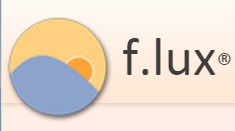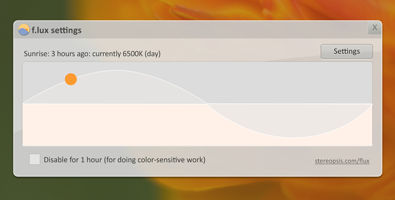| Fear And Loathing in The App Store 15 - Apple Bans F.lux And Then Duplicates It |
| Written by Lucy Black | |||
| Wednesday, 20 January 2016 | |||
|
Back in November 2015 we explained how F.lux had been banned from the app store for violating the Developer Program Agreement. This wasn't good, but now Apple has implemented the same functionality as part of iOS 9.3. This pushes the boundaries of fear and loathing about as far as it can go.
F.lux is an app that changes the color balance depending on the time of day so that your biological clock isn't disturbed. The idea is that you will sleep better if your device emits less blue light at night. The people at F.lux really believe in their cause and suggest that sleep disturbances can make you ill. F.lux is a free app. You can get the f.lux app on a range of devices, but to make it work on iOS it was necessary to use an undocumented API to change the system colors slightly. This resulted in the app not being allowed in the App Store . Instead it was supplied as a slide loading app to anyone who knew enough to be able to follow the instructions. However, Apple noticed and made it clear that the practice was in violation of the Developer Program Agreement. Even though the app was not in the App Store there was no alternative for its creators but to stop making it available on iOS devices by other means.
This is quite a story, but now we have the final twist. The beta version of iOS 9.3 incorporates a new feature - Night Shift. This uses the time and geolocation to modify the color balance of the display so that you can sleep better. Sounds familiar? If you were the makers of f.lux you might well be a little angry, but the actual response is more balanced and moderate.
Apple announced this week that they’ve joined our fight to use technology to improve sleep. There is a lot to be done. Indeed, workers on the “night shift” have nearly double the lifetime risk of cancer and much of this is believed to be driven by exposure to bright light at the wrong times. Apple’s involvement in fixing this problem is a big commitment and an important first step.
However the F.lux team clearly believes that its version is better and worth being added to the user's option. Rather than suggest simple answers, our mission is to enable f.lux to advance the science, while providing customized solutions for each person. We intend to make f.lux better in every way than the app we designed back in 2009. Today we call on Apple to allow us to release f.lux on iOS, to open up access to the features announced this week, and to support our goal of furthering research in sleep and chronobiology.
In the days before the closed world of the app store it wasn't unknown for an OS to incorporate some feature or other that previously had been provided by a third party. One of the risks in developing anything that modified the basic functionality of an OS was that your work might be so successful that it was simply assimilated. However, in those days you still had the right to "fight on" with new and better versions of your app and hope that enough users would still prefer your enhanced feature set to the built-in basics. Of course today things are very different. You can be banned and then assimilated. To put the other side of the case you can argue that Apple's implementation was "proper" and hence safe and this is all good for the user. Lack of choice is never good for the consumer.
More InformationResponse to Apple's announcement Fear and Loathing In The App Store
Epic Games CEO Finally Notices That UWP Apps Are A Walled Garden To be informed about new articles on I Programmer, sign up for our weekly newsletter, subscribe to the RSS feed and follow us on, Twitter, Facebook, Google+ or Linkedin.
Comments
or email your comment to: comments@i-programmer.info |
|||
| Last Updated ( Wednesday, 20 January 2016 ) |



